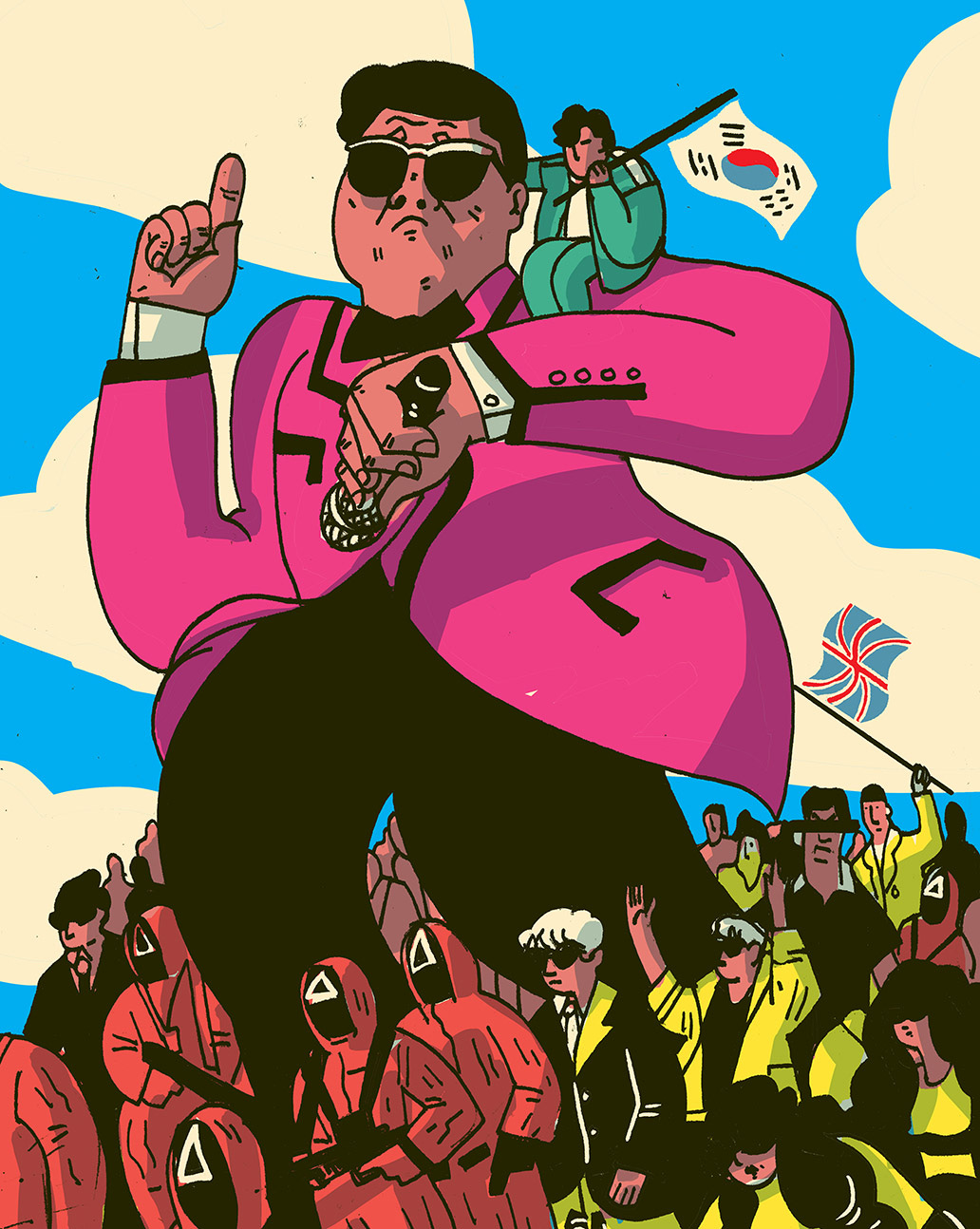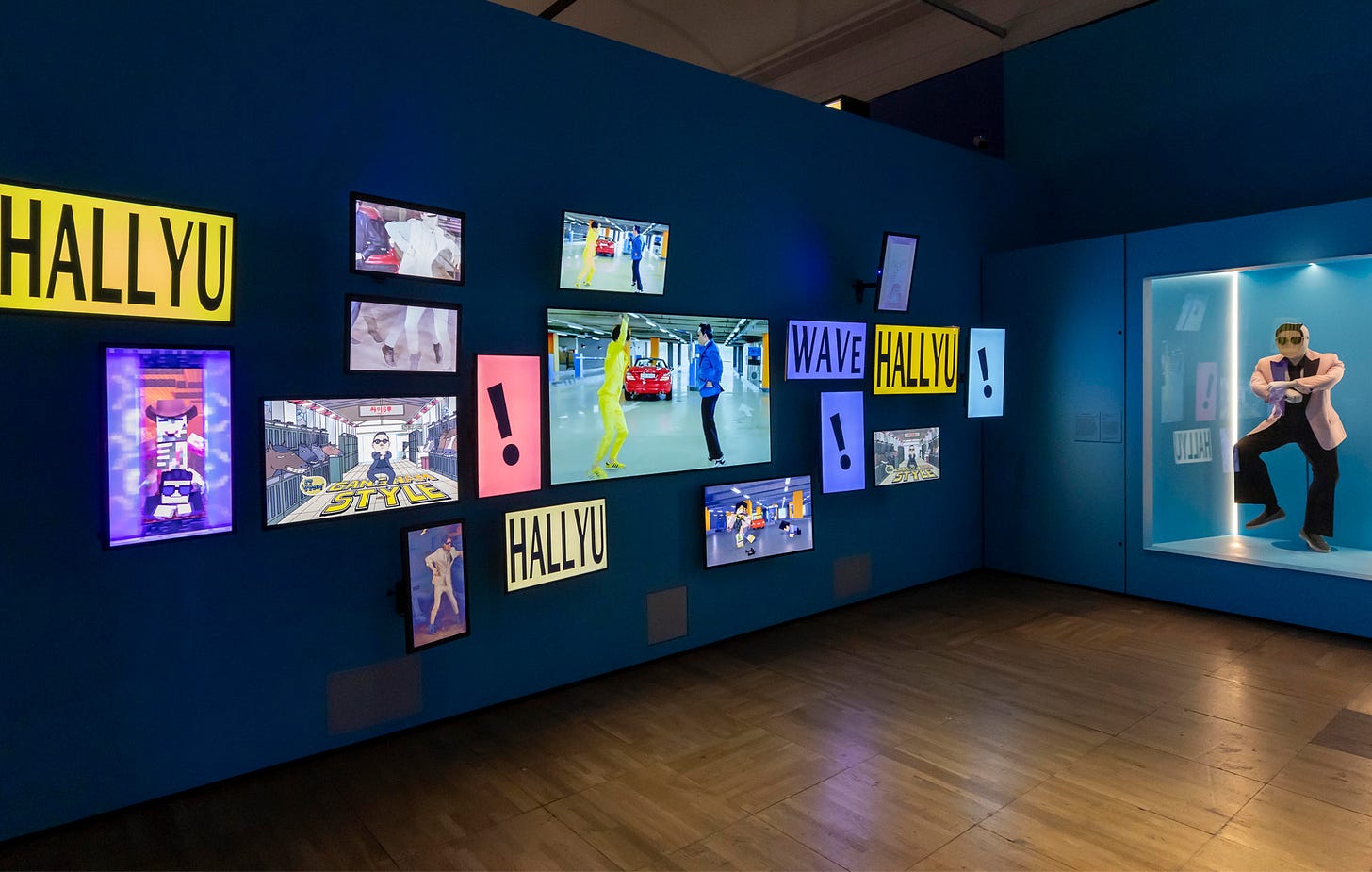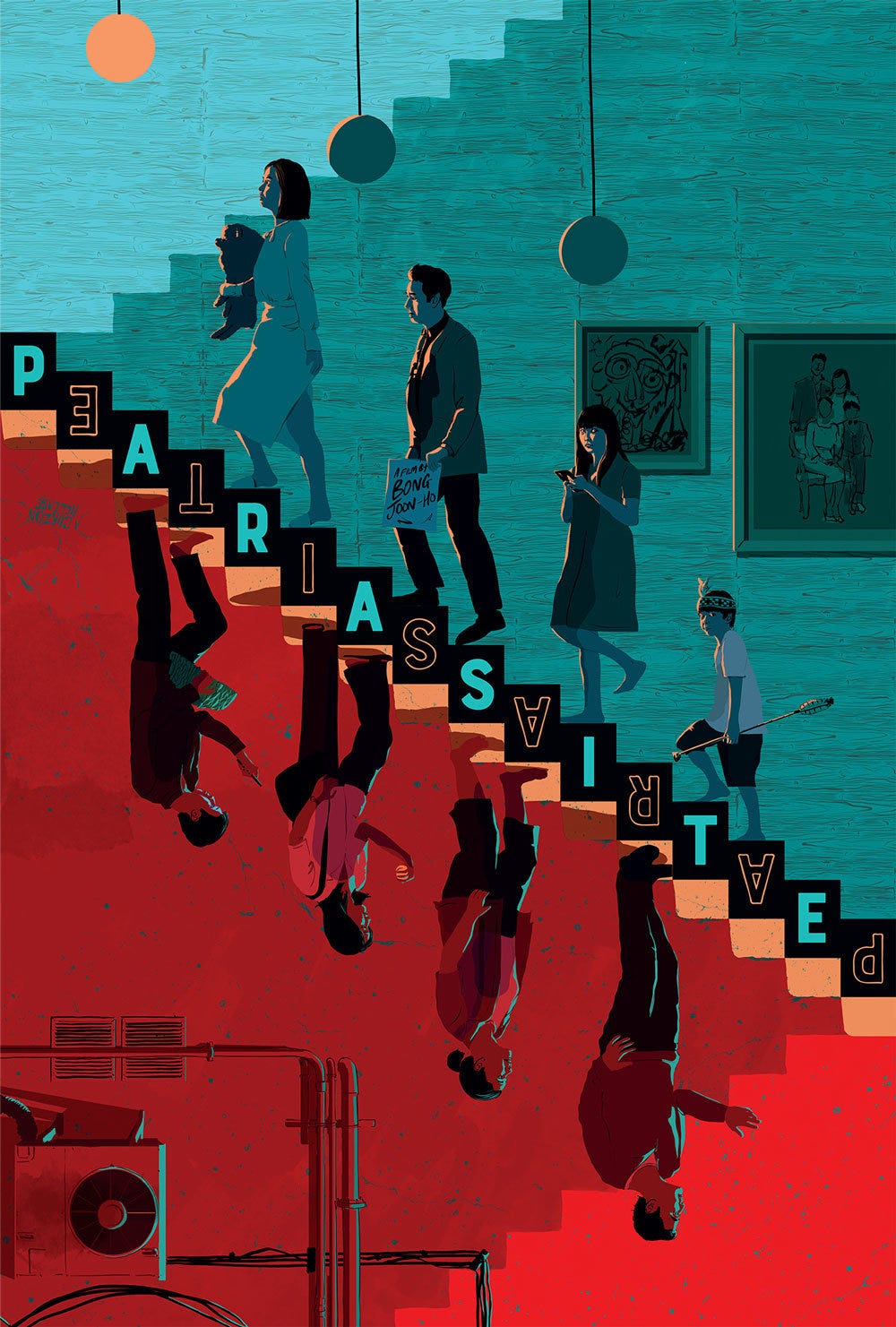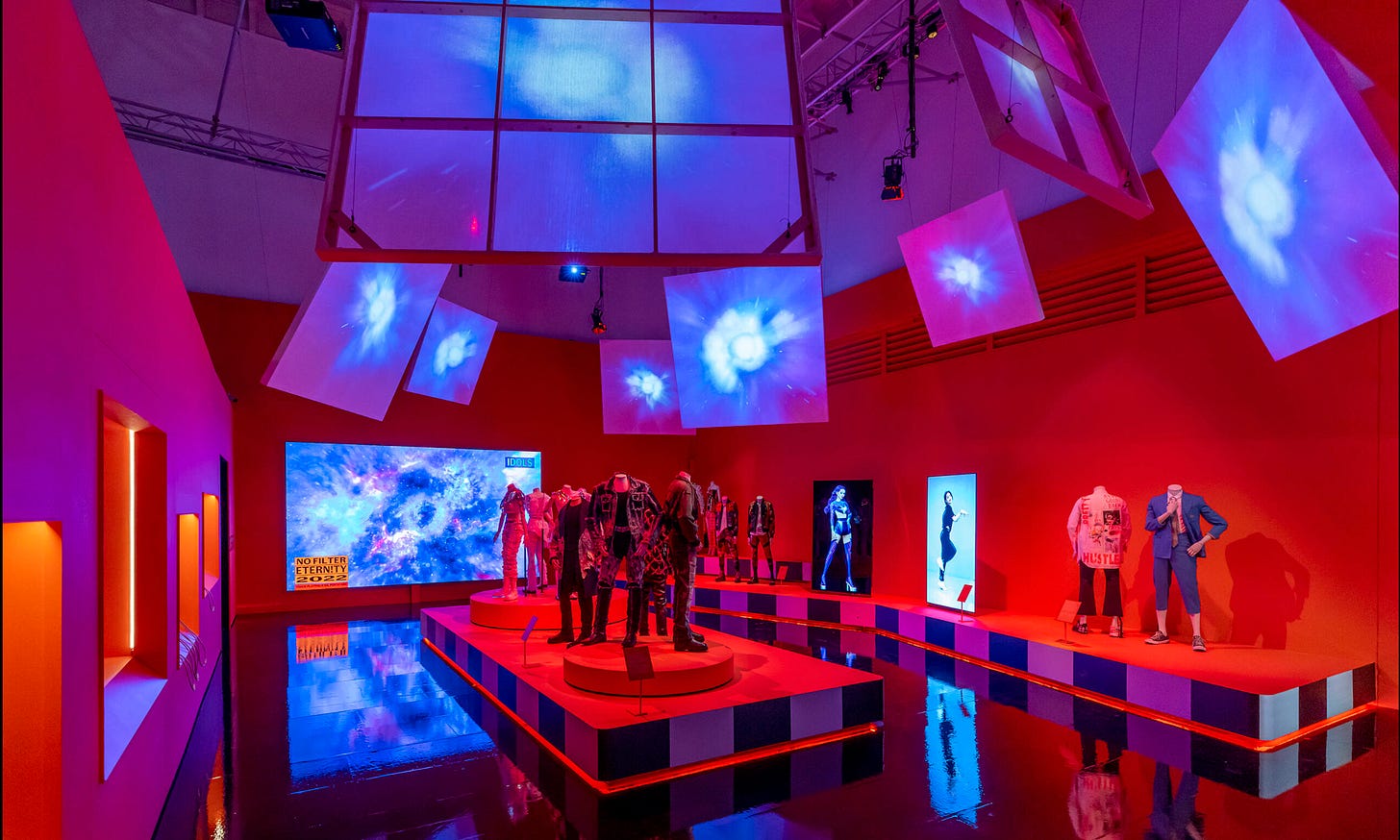Soft Power
Korean pop-culture & the value of UK creativity

Korea has one of the world’s greatest arsenals of cultural clout.
Visiting Hallyu! The Korean Wave at The V&A means being an innocent bystander to an explosion of K-Pop Fandom, beauty, technology, fashion, gaming, webcomics, and cinematic storytelling.
You leave it reeling from the sheer variety and modernity of Korean1 creativity, and with the sense that we’re living in a world which their unique strain of pop-culture has created and now dominated. Korean creative culture is able to transform even political and economic dysfunction into world-class entertainment, as shown by the amount of spectacular Korean storytelling rooted in its economic inequality and rigged faux-meritocracy.
It’s easy to dismiss this as somehow frivolous, until you delve into the results:
K-Pop idols BTS have sold 34 million albums globally.2
Squid Games pulled in 1.6 billion hours of viewing, and reached an estimated 142 million households3.
Parasite is the first foreign-language film to win a best picture Oscar.
Korea is the third largest exporter of beauty products in the world4
Korea’s cultural exports are estimated to bring in about $11.7 billion
Culture is a potent weapon. Take it from one of the world’s pre-eminent authorities on military strategy, Colin Gray - in Out of the Wilderness: Prime Time for Strategic Culture, published for the U.S. Department of Defence, he wrote:
“Culture is of the utmost importance. It functions at, indeed as, the engine of thought and behaviour.”
He wasn’t talking about Gangnam Style pony dance memes or Korean soap operas popularising massive 'phablet’ smartphones in China. But in an attention economy where everything competes with everything, the ability to use culture to attract people’s attention and change their behaviour is soft power.
Korea isn’t just a pop-culture machine, it’s a soft power colossus.
Power falls into two categories5: the ability to make people do things that they don’t want to do, or stop doing something that they do want to do. Soft power is a weapon, and whilst less dangerous than hard power, it should still be wielded with care. Let’s take some film and TV examples:
Top Gun is a prime example of soft power as a recruiting tool for hard power - recruitment for US naval aviation increased by 500% in the wake of the original film’s release6, which led naval aviation recruitment teams to set up booths outside Top Gun: Maverick screenings in the US.
After the ‘we are not drinking fucking Merlot!’ scene in Sideways, there was a 7% slide in Merlot sales and a 16% uplift in Pinot Noir consumption7
In Brazil, Globo’s telenovelas and their progressive depictions of families affected both birth rates and divorce rates8 .
To anyone who works in commercial communication effects like this won’t be news, but it’s rare that we think about them on a national level. The marketplace of ideas is a global one, and those with the best memes, stories and images win. Pushed to its limit this leads to the sort of psy-ops the CIA pursues- and it’s why American policy-makers are increasingly concerned about the amount of attention that TikTok commands given that it’s a Chinese company. Soft power matters.
Of course, it seems unlikely that the Korean creative class started out thinking about their work as a tool of national power, or that the results would have been good if they did - but it would also seem ludicrous that anyone in Korean government would do anything other than throw money and resources at its creative industries to expand their reach, prestige and impact. Wouldn’t it? Well, let’s imagine a parallel case.
It has world-beating theatre, cinema, music, gaming, sports, fashion and educational sectors, a world-leading life sciences sector, a monarchy that people all over the world are inexplicably obsessed with, and the world’s most respected broadcaster.
If South Korea is a soft-power colossus, then so is the UK.
Monocle’s latest Soft Power Index has the UK at #8 in the world, behind the US, Denmark, France, South Korea, Switzerland, Japan, and Germany.
You feel the UK’s soft power when you visit America and hear Sam Smith, Ed Sheeran and Dua Lipa dominating streaming, when you go to Uganda and all the kids there want to know what Premier League Club you support, or when you go to Brazil and your mother-in-law can tell you as much about Meghan and Harry as she can about the latest novela. It’s there in the enduring reach and respect for the BBC, and in the global box-office takings of Harry Potter and James Bond. I’m less keen on returning to an era of globe-straddling hard power, but I am interested in having global cultural clout and reach disproportionate to the UK’s size. The more influence and scale our creative talent has on the global stage, the less we might be inclined to pick pointless fights with foreign countries about fishing quotas and bendy bananas. Soft power is a decent indicator of our national health, talent and creative ingenuity in the global marketplace of ideas. And it’s good for UK PLC. The numbers speak for themselves:
The creative industries represent 6% of UK GDP9 , and 12% of all UK services exports. They contribute more to the UK economy than aerospace, automotive, life sciences, and the oil and gas sectors combined10.
We export £46 billion of creative goods and services each year, and 90% of the value of creative industry exports is created here in the UK.
An extra 1.4m jobs were reliant on the creative sector through its supply chains - a combined total of 3.5 million, or more than 1 in 10 UK jobs. For every £1 the Creative Industries contributed directly to GVA, they generated another 50p elsewhere in the economy.
But we’re punching the crown jewels of soft power in the crown jewels
Let’s present the case for the prosecution:
Exhibit A: Brexit, which has made access to the single market for our creative exports increasingly challenging, and also cut off sources of EU funding that might be invested in the creative industries.
Exhibit B: The BBC, an internationally respected broadcaster which the Conservative party have spent the last few years threatening to defund.
Exhibit C: Investment. The UK has had an under-investment problem for some time11 , and the creative industries are no different. Unlike Korea, we exclude creative industries from receiving Research and Development Tax Relief12 and so they get less money to power their ideas.
These acts of masochism aren’t just hurting the creative industries. As everyone can feel and see in our national dialogue, politics and economic indicators, the UK is in a prolonged slump. It’s a question for someone smarter than me to identify what we do to shock the moribund patient back into life (start here with Chartbook) but it would be stupid not to make creativity an integral part of it.
Whoever governs in the next few years will have hard choices to make about spending taxpayer money: facing a recession, strikes, energy shocks, creaking public services and a climate crisis, it’s tempting to conclude that no-one should give a shit about the creative industries. But we shouldn’t dismiss it as bread and circuses.
Creativity creates jobs and growth, but it also makes people’s lives meaningful and enjoyable. We should be treating the creative industries as an economic engine for the UK’s national life and international reach. It’s time for a reset. Let’s start with a few provocations:
Who should this nation’s First Minister for Soft Power be, and who should be on the advisory committee?
Who should it be looking to attract? What institutions should it partner up with?
What are the current constraints on UK soft power, and how could we remove them? What would the best rocket fuel be for our creative muscle?
How do we stop our soft power being concentrated in London and devolve it to the regions?
The government recently launched ARIA - the British equivalent of DARPA, America’s pioneering moonshot research agency which led the way on a range of innovations including GPS, drones, stealth technology, voice interfaces. This is a laudable initiative that probably won’t bear results for a while, and I will be clapping the investment with every failed experiment and botched test. But Aria has a budget of £800 million, and the UK’s latest creative industry funding was £50 million. Science and creativity should be in dialogue, not competition - but if we can supercharge an agency to build technologies that don’t yet exist and may not ever achieve commercial application, we can also invest more in a sector that's already an integral contributor to our national value and values. It’s time for some cultural engineering too.
Bring on the new era of UK Soft Power.
Korea’ refers to the South Korea or The Republic of Korea. All complaints to Kim Jong-Un
Source: Monocle Soft Power Index, January 2023
Nielsen, November 2021
“Hallyu: The Korean Wave” - V&A Exhibition Commentary
Moses Naim: The End of Power
https://screenrant.com/top-gun-us-navy-recruiting-applications-increase/
https://mag.sommtv.com/2021/07/sideways-impact-merlot/
International Development Bank: “Television and Divorce: Evidence from Brazilian Novelas,” by Alberto Chong and Eliana La Ferrara (January 2009) and “Soap Operas and Fertility: Evidence from Brazil,” by La Ferrara, Chong and Duryea (October 2008).
Lords Library, Impact of Government Policy on the Creative Sector, 28th October 2021
UKCI Report - 2021, https://pec.ac.uk/news/national-statistics-on-the-creative-industries
The Economist, “What A Comparison Between UK & Italy Reveals”, October 2022
Creative Industries Policy & Evidence Centre, “The Art of R&D”










Fascinating concepts! From my American perspective, British cultural influence never waned in the arena of children's literature. My younger years were saturated with British conceptions of childhood—Winnie the Pooh, The Wind in the Willows, Alice in Wonderland, Beatrix Potter, Little Grey Rabbit. There doesn't seem to be any American classic kids' literature at all comparable; I would argue that the American idea of a peaceful, happy, rural childhood of innocence and wonder is actually an British idea.